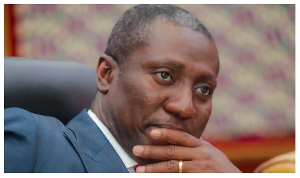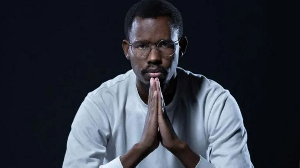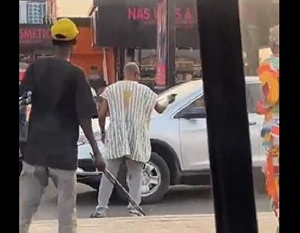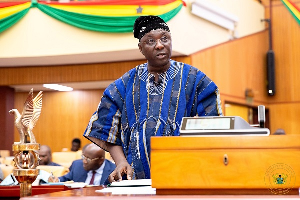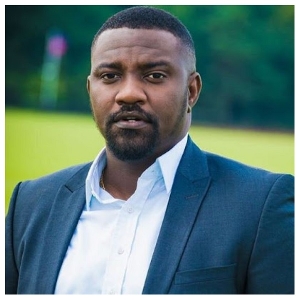Kenyan business student Nelson Amenya has been hailed as a hero by those campaigning for greater transparency in the deals his government makes with private firms.
Recent Kenyan history is littered with stories of huge contracts that have resulted from corruption – and despite laws that are supposed to prevent this from happening, there are suspicions that it continues to take place.
Thirty-year-old Mr Amenya, who is studying in France for an MBA, leaked details on social media of what he said was a proposed agreement between Kenya and the Adani Group, an Indian multinational, in July.
It concerned the management of Jomo Kenyatta International Airport (JKIA) – the country's - and region's - biggest airport, which is long overdue a complete overhaul.
"The first feeling I had [when I was passed the documents] was that it was just another government deal… I did not understand the magnitude or the seriousness of it," Mr Amenya, whose profile as an anti-corruption activist had been on the rise, tells the BBC.
The documents detailed a $2bn (£1.6bn) proposal by the Adani Group to lease JKIA for 30 years in order to modernise and run it.
As he started to go through the papers, he felt that if it was to go ahead, it "was going to hurt the Kenyan economy" while all the benefit would go to the Indian multinational.
The deal appeared unfair to him, according to what he read, as Kenya would still be putting in the largest share of the money but not reaping the financial rewards.
Mr Amenya had good reason to think the papers were genuine as "the people who were giving me these documents were from very legitimate departments of government", he says.
The Adani Group is involved in infrastructure, mining and energy projects globally, in countries such as Israel, the UAE, France, Tanzania, Australia and Greece. Its founder Gautam Adani is a big player in India's economy and is a close ally of India's Prime Minister Narendra Modi.
Through further reading, Mr Amenya says he discovered that the Adani deal with Kenya could have left his country with an obligation to pay the company if it did not recoup its investment.
"This was a great breach of trust of the people by the leadership of the president, the Kenya Airports Authority, the minister - they all betrayed the people," he alleges.
Despite the evidence in his hands, Mr Amenya wrestled with what to do next. His own safety was at risk, though being in France he was better off than being in Kenya, where anti-corruption activists have been targeted and some killed.
"I was a bit scared. I didn't know what's going to happen. I'm risking my career, I'm risking my life, why should I take the risk to do this?" he asked himself at the time.
However, in the end he felt that staying quiet was not an option.
"You know, it's only cowards who live long."
After spending weeks going through what he had been sent, Mr Amenya leaked the documents on his X page in July, immediately sparking outrage in Kenya.
JKIA airport workers went on strike demanding that the deal be scrapped.
"It felt like a duty for me, for my country. Even if I am far away, I still have a duty for my country. I want to see a better Kenya, my home country becoming developed, industrialised and an end to corruption."
He worried that the airport deal was a harbinger of what might come next.
Mr Amenya says it was not just the unusual terms and lack of transparency that rang alarm bells, it was also, he alleges, that Kenyan laws appeared to have been systematically ignored.
"[The authorities] never did due diligence for this company… they did not follow the due process of procurement."
He alleges that some government officials hoped to bypass the legal requirements, including public consultation, that are supposed to prevent taxpayers' money from being misspent.
A report in April by the Kenya Airports Authority on the proposed deal highlighted that there was no plan to consult stakeholders on the plan.
"This was in April, and by July when I was exposing this, they had not done any public participation. It was quite secret this deal, and by that time they were just a month away from signing the deal," Mr Amenya alleges.
"After I exposed this deal is when they hurriedly tried to come and do like a sham public participation - they called the Kenya Airports Authority staff and started to have stakeholder meetings."
Various officials and branches of the state denied allegations of corruption in the process and the authorities went ahead to sign another multimillion dollar deal with the Adani Group – this time to construct power lines.
The Adani Group said Mr Amenya's claims were baseless and malicious.
A spokesperson told the BBC that "the proposal was submitted following Kenyan Public Private Partnership regulations and was intended to create a world class airport and significantly enhance the Kenyan economy by creating numerous new jobs".
The Adani Group further says that no contract was signed as "discussions did not progress to a binding agreement".
The company also says the proposal for the energy deal was above board and that the company "categorically refutes all allegations and insinuations of any violation of Kenyan laws in our operations or proposals.
"Every project we undertake is governed by a strong commitment to compliance, transparency and the laws of the respective countries in which we operate," the statement read.
But it was not Mr Amenya's leak that actually changed the government's mind.
It was only when the US authorities indicted Gautam Adani for alleged involvement in a $250m (£200m) bribery scheme that Kenya acted.
Representatives from the Adani Group denied the allegations from US prosecutors and called them "baseless".
At a state-of-the-nation address in parliament last month, Kenya's President William Ruto announced the cancellation of both Adani deals.
"In the face of undisputed evidence or credible information on corruption, I will not hesitate to take decisive action," Ruto said in a speech met with loud cheers inside parliament.
Kenyans celebrated the decision which Ruto attributed to new information provided by investigative agencies and partner nations.
"I was in class when this announcement came. I couldn't believe it," Mr Amenya says.
"I think in the first one hour, I had tears in my eyes. I was so happy."
Although he does not see himself as a hero, messages of support poured in from everywhere, including from India.
Forty minutes after the class ended, he posted his now-famous tweet "Adios Adani!!" - goodbye Adani.
"It was momentous… All that I did finally paid off."
The feeling of triumph, however, came after months of personal struggle and pressure.
Soon after exposing the airport deal, Mr Amenya was sued for defamation by an Adani Group representative and a Kenyan politician, making him question whether he should continue.
"Some people were coming to me from the government, they were even ready to pay me, they were telling me: 'You need to cash out and just stop this fight with the government,'" he recalls.
"It would have been the biggest mistake of my life to give up, a betrayal to the Kenyan people."
But even after scrapping the deals, President Ruto still questions why Kenyans opposed this and many other projects he has championed. He says he will find a way to upgrade the airport.
"I saw them saying that those who stopped the upgrading of our airport are heroes. Heroes? What do you gain when you stop the building of an airport in your country?" Ruto asked at a public function in early December.
"You have no clue how it's going to be built, and those who are opposed have never even stepped foot inside an airport, you just want to oppose."
Mr Amenya, who is still facing the defamation cases, is now fundraising to help with his legal fees, and says his future in Kenya is uncertain.
"I have received threats from credible intelligence agencies and people in Kenya that have warned me not to go back because obviously there's some people who are very angry with what I did," he says.
A hefty price, but one Mr Amenya says he would gladly pay again.
"We don't really need to wait for someone to save us," he says.
Click to view details



Africa News of Friday, 20 December 2024
Source: bbc.com
The student who blew whistle on Kenya airport controversy
Opinions
